Comparing CBT and Antidepressants for Adolescent Depression Treatment
VerifiedAdded on 2023/04/04
|10
|2158
|91
Report
AI Summary
This report critically examines a quantitative research article that investigates the efficacy of Cognitive Behavioral Therapy (CBT) compared to antidepressants in treating adolescent depression within a primary care setting. The study, employing a randomized controlled trial, involved adolescents aged 12-18, with participants randomized to either a CBT intervention group or a control group receiving self-selected treatments, often antidepressants. The report details the study's design, setting, participants, interventions, outcomes, and results. The key findings suggest that CBT, particularly when combined with other treatments, is a beneficial non-pharmacological intervention, potentially reducing suicidal thoughts, improving academic performance, and alleviating low mood in adolescents. The report also addresses potential biases, adverse events, knowledge gaps, ethical issues, and the implications for clinical practice, including barriers to implementing CBT effectively. The analysis emphasizes the importance of CBT as an alternative or supplementary therapy to antidepressants, especially in the context of primary care for adolescent depression.
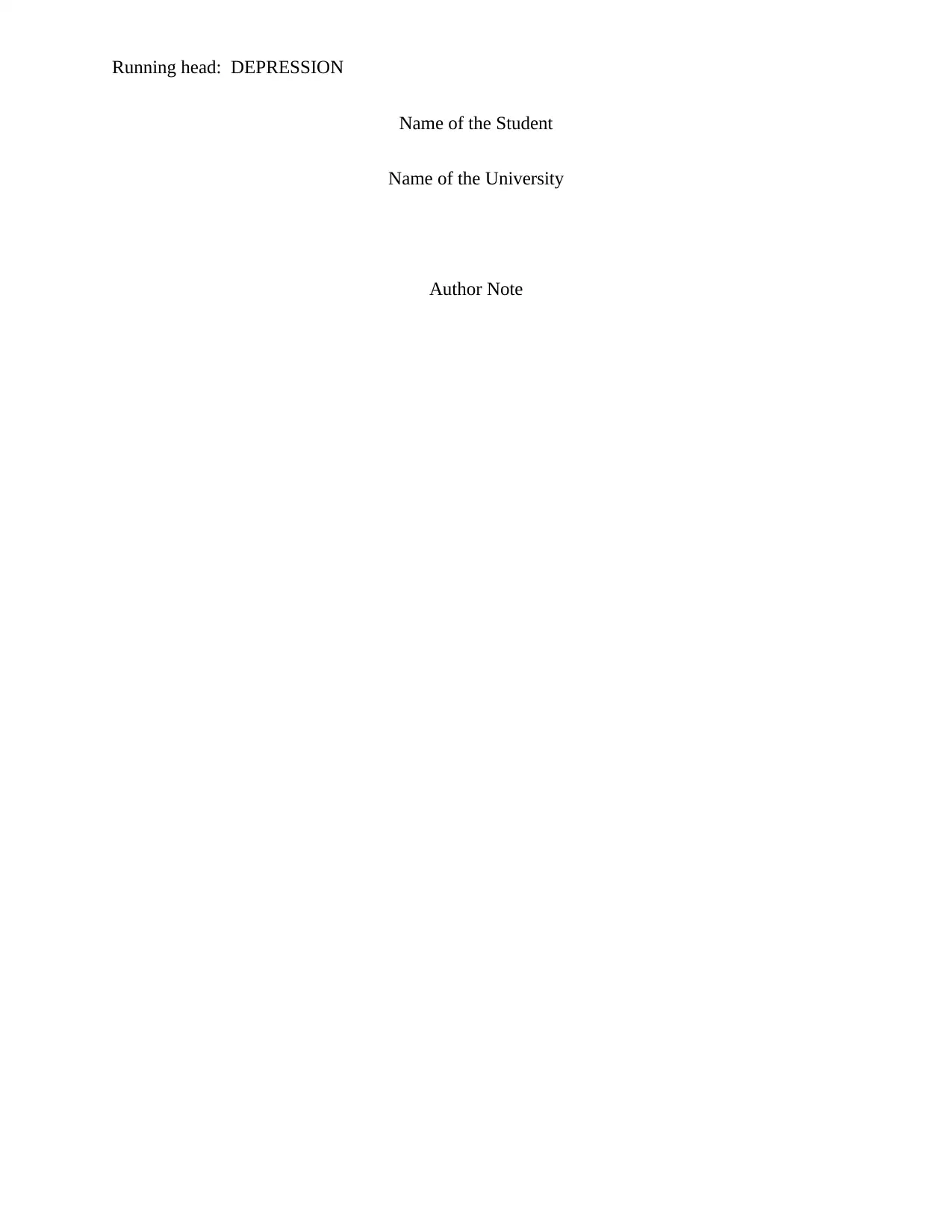
Running head: DEPRESSION
Name of the Student
Name of the University
Author Note
Name of the Student
Name of the University
Author Note
Paraphrase This Document
Need a fresh take? Get an instant paraphrase of this document with our AI Paraphraser
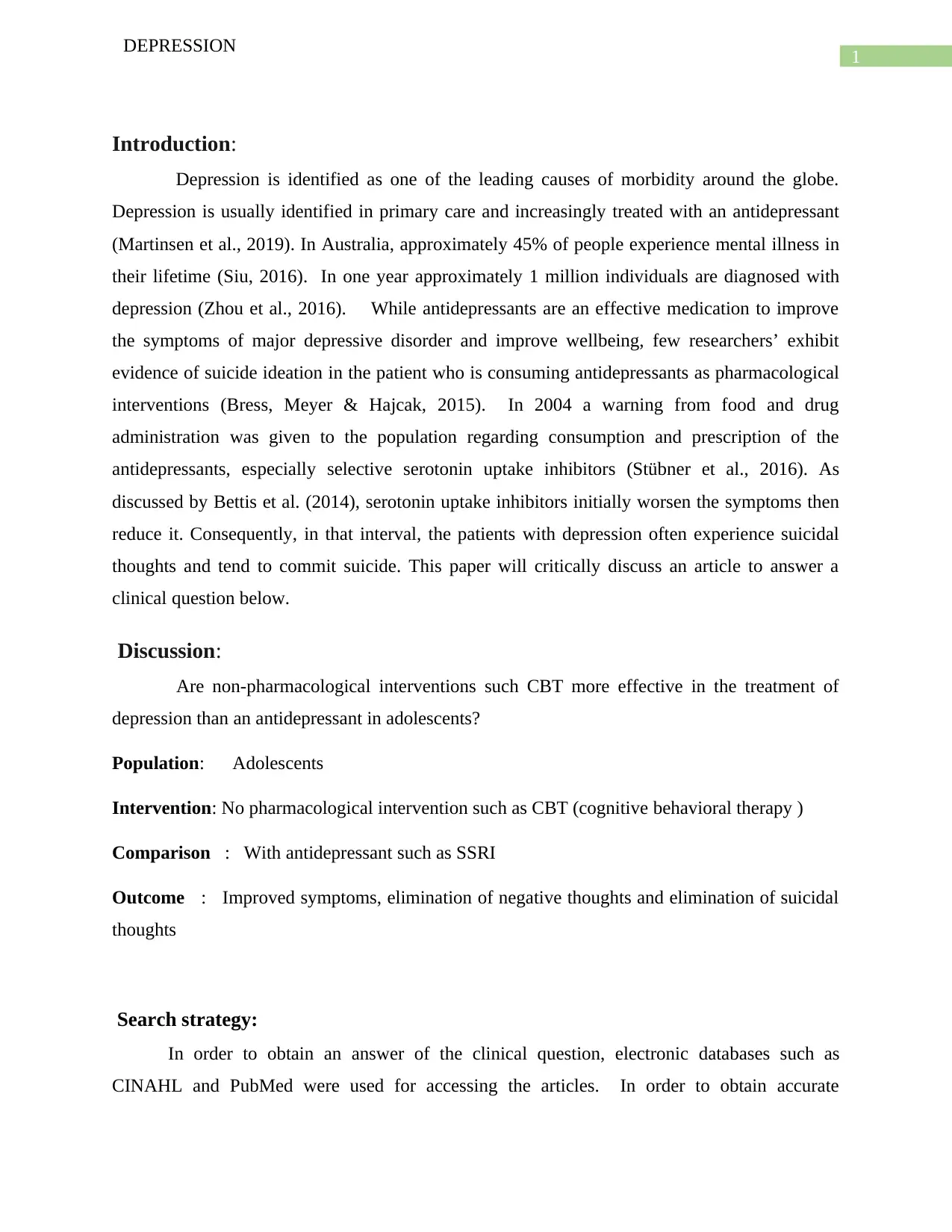
1
DEPRESSION
Introduction:
Depression is identified as one of the leading causes of morbidity around the globe.
Depression is usually identified in primary care and increasingly treated with an antidepressant
(Martinsen et al., 2019). In Australia, approximately 45% of people experience mental illness in
their lifetime (Siu, 2016). In one year approximately 1 million individuals are diagnosed with
depression (Zhou et al., 2016). While antidepressants are an effective medication to improve
the symptoms of major depressive disorder and improve wellbeing, few researchers’ exhibit
evidence of suicide ideation in the patient who is consuming antidepressants as pharmacological
interventions (Bress, Meyer & Hajcak, 2015). In 2004 a warning from food and drug
administration was given to the population regarding consumption and prescription of the
antidepressants, especially selective serotonin uptake inhibitors (Stübner et al., 2016). As
discussed by Bettis et al. (2014), serotonin uptake inhibitors initially worsen the symptoms then
reduce it. Consequently, in that interval, the patients with depression often experience suicidal
thoughts and tend to commit suicide. This paper will critically discuss an article to answer a
clinical question below.
Discussion:
Are non-pharmacological interventions such CBT more effective in the treatment of
depression than an antidepressant in adolescents?
Population: Adolescents
Intervention: No pharmacological intervention such as CBT (cognitive behavioral therapy )
Comparison : With antidepressant such as SSRI
Outcome : Improved symptoms, elimination of negative thoughts and elimination of suicidal
thoughts
Search strategy:
In order to obtain an answer of the clinical question, electronic databases such as
CINAHL and PubMed were used for accessing the articles. In order to obtain accurate
DEPRESSION
Introduction:
Depression is identified as one of the leading causes of morbidity around the globe.
Depression is usually identified in primary care and increasingly treated with an antidepressant
(Martinsen et al., 2019). In Australia, approximately 45% of people experience mental illness in
their lifetime (Siu, 2016). In one year approximately 1 million individuals are diagnosed with
depression (Zhou et al., 2016). While antidepressants are an effective medication to improve
the symptoms of major depressive disorder and improve wellbeing, few researchers’ exhibit
evidence of suicide ideation in the patient who is consuming antidepressants as pharmacological
interventions (Bress, Meyer & Hajcak, 2015). In 2004 a warning from food and drug
administration was given to the population regarding consumption and prescription of the
antidepressants, especially selective serotonin uptake inhibitors (Stübner et al., 2016). As
discussed by Bettis et al. (2014), serotonin uptake inhibitors initially worsen the symptoms then
reduce it. Consequently, in that interval, the patients with depression often experience suicidal
thoughts and tend to commit suicide. This paper will critically discuss an article to answer a
clinical question below.
Discussion:
Are non-pharmacological interventions such CBT more effective in the treatment of
depression than an antidepressant in adolescents?
Population: Adolescents
Intervention: No pharmacological intervention such as CBT (cognitive behavioral therapy )
Comparison : With antidepressant such as SSRI
Outcome : Improved symptoms, elimination of negative thoughts and elimination of suicidal
thoughts
Search strategy:
In order to obtain an answer of the clinical question, electronic databases such as
CINAHL and PubMed were used for accessing the articles. In order to obtain accurate
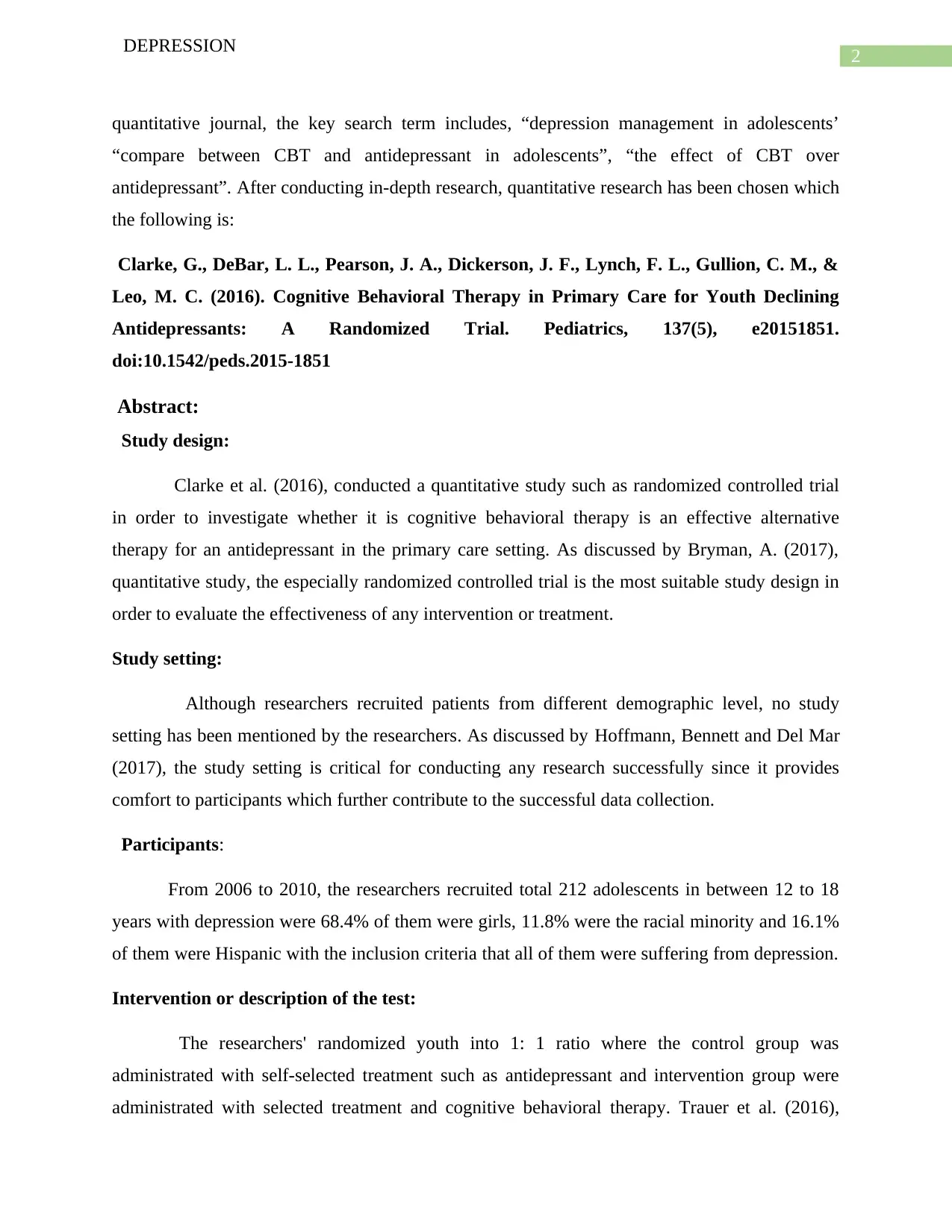
2
DEPRESSION
quantitative journal, the key search term includes, “depression management in adolescents’
“compare between CBT and antidepressant in adolescents”, “the effect of CBT over
antidepressant”. After conducting in-depth research, quantitative research has been chosen which
the following is:
Clarke, G., DeBar, L. L., Pearson, J. A., Dickerson, J. F., Lynch, F. L., Gullion, C. M., &
Leo, M. C. (2016). Cognitive Behavioral Therapy in Primary Care for Youth Declining
Antidepressants: A Randomized Trial. Pediatrics, 137(5), e20151851.
doi:10.1542/peds.2015-1851
Abstract:
Study design:
Clarke et al. (2016), conducted a quantitative study such as randomized controlled trial
in order to investigate whether it is cognitive behavioral therapy is an effective alternative
therapy for an antidepressant in the primary care setting. As discussed by Bryman, A. (2017),
quantitative study, the especially randomized controlled trial is the most suitable study design in
order to evaluate the effectiveness of any intervention or treatment.
Study setting:
Although researchers recruited patients from different demographic level, no study
setting has been mentioned by the researchers. As discussed by Hoffmann, Bennett and Del Mar
(2017), the study setting is critical for conducting any research successfully since it provides
comfort to participants which further contribute to the successful data collection.
Participants:
From 2006 to 2010, the researchers recruited total 212 adolescents in between 12 to 18
years with depression were 68.4% of them were girls, 11.8% were the racial minority and 16.1%
of them were Hispanic with the inclusion criteria that all of them were suffering from depression.
Intervention or description of the test:
The researchers' randomized youth into 1: 1 ratio where the control group was
administrated with self-selected treatment such as antidepressant and intervention group were
administrated with selected treatment and cognitive behavioral therapy. Trauer et al. (2016),
DEPRESSION
quantitative journal, the key search term includes, “depression management in adolescents’
“compare between CBT and antidepressant in adolescents”, “the effect of CBT over
antidepressant”. After conducting in-depth research, quantitative research has been chosen which
the following is:
Clarke, G., DeBar, L. L., Pearson, J. A., Dickerson, J. F., Lynch, F. L., Gullion, C. M., &
Leo, M. C. (2016). Cognitive Behavioral Therapy in Primary Care for Youth Declining
Antidepressants: A Randomized Trial. Pediatrics, 137(5), e20151851.
doi:10.1542/peds.2015-1851
Abstract:
Study design:
Clarke et al. (2016), conducted a quantitative study such as randomized controlled trial
in order to investigate whether it is cognitive behavioral therapy is an effective alternative
therapy for an antidepressant in the primary care setting. As discussed by Bryman, A. (2017),
quantitative study, the especially randomized controlled trial is the most suitable study design in
order to evaluate the effectiveness of any intervention or treatment.
Study setting:
Although researchers recruited patients from different demographic level, no study
setting has been mentioned by the researchers. As discussed by Hoffmann, Bennett and Del Mar
(2017), the study setting is critical for conducting any research successfully since it provides
comfort to participants which further contribute to the successful data collection.
Participants:
From 2006 to 2010, the researchers recruited total 212 adolescents in between 12 to 18
years with depression were 68.4% of them were girls, 11.8% were the racial minority and 16.1%
of them were Hispanic with the inclusion criteria that all of them were suffering from depression.
Intervention or description of the test:
The researchers' randomized youth into 1: 1 ratio where the control group was
administrated with self-selected treatment such as antidepressant and intervention group were
administrated with selected treatment and cognitive behavioral therapy. Trauer et al. (2016),
⊘ This is a preview!⊘
Do you want full access?
Subscribe today to unlock all pages.

Trusted by 1+ million students worldwide
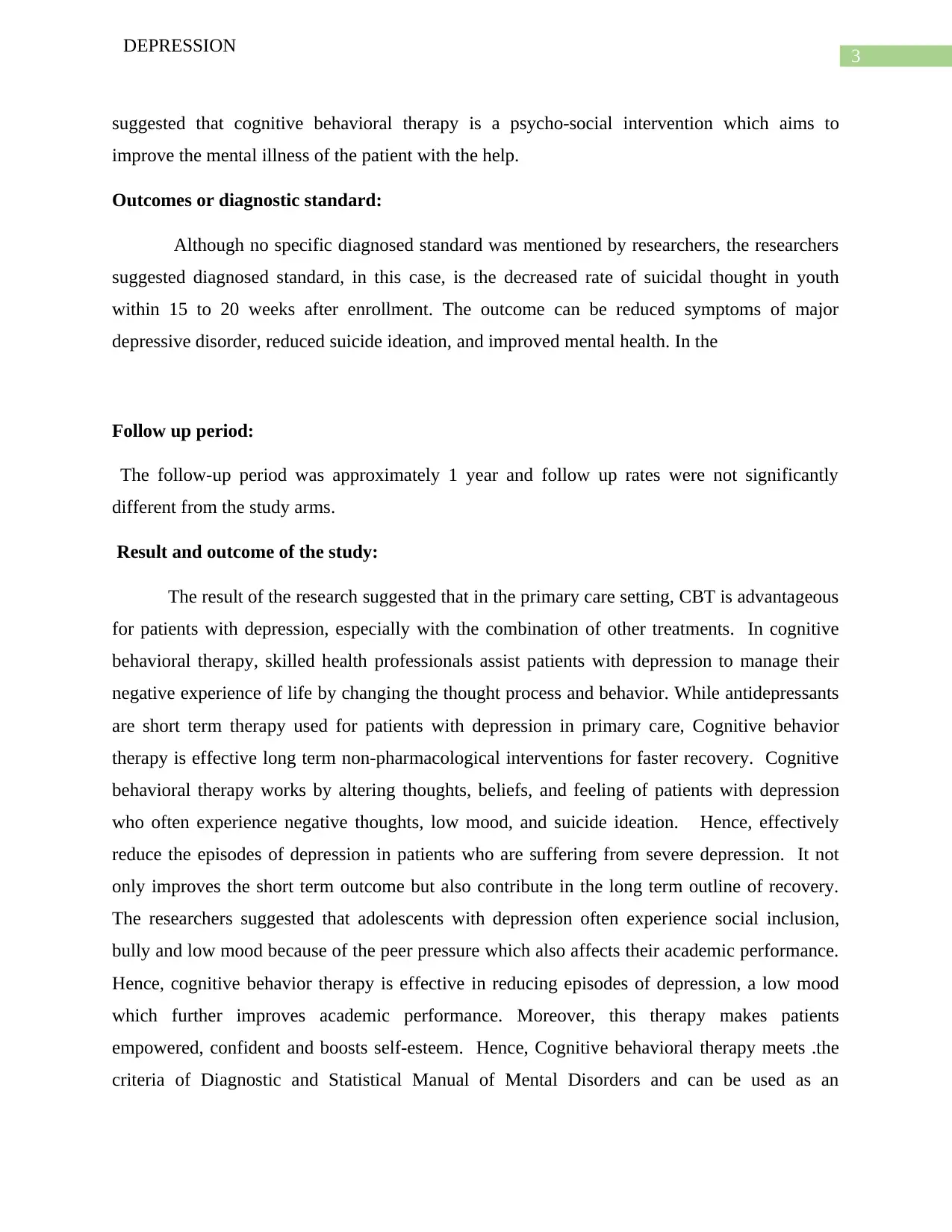
3
DEPRESSION
suggested that cognitive behavioral therapy is a psycho-social intervention which aims to
improve the mental illness of the patient with the help.
Outcomes or diagnostic standard:
Although no specific diagnosed standard was mentioned by researchers, the researchers
suggested diagnosed standard, in this case, is the decreased rate of suicidal thought in youth
within 15 to 20 weeks after enrollment. The outcome can be reduced symptoms of major
depressive disorder, reduced suicide ideation, and improved mental health. In the
Follow up period:
The follow-up period was approximately 1 year and follow up rates were not significantly
different from the study arms.
Result and outcome of the study:
The result of the research suggested that in the primary care setting, CBT is advantageous
for patients with depression, especially with the combination of other treatments. In cognitive
behavioral therapy, skilled health professionals assist patients with depression to manage their
negative experience of life by changing the thought process and behavior. While antidepressants
are short term therapy used for patients with depression in primary care, Cognitive behavior
therapy is effective long term non-pharmacological interventions for faster recovery. Cognitive
behavioral therapy works by altering thoughts, beliefs, and feeling of patients with depression
who often experience negative thoughts, low mood, and suicide ideation. Hence, effectively
reduce the episodes of depression in patients who are suffering from severe depression. It not
only improves the short term outcome but also contribute in the long term outline of recovery.
The researchers suggested that adolescents with depression often experience social inclusion,
bully and low mood because of the peer pressure which also affects their academic performance.
Hence, cognitive behavior therapy is effective in reducing episodes of depression, a low mood
which further improves academic performance. Moreover, this therapy makes patients
empowered, confident and boosts self-esteem. Hence, Cognitive behavioral therapy meets .the
criteria of Diagnostic and Statistical Manual of Mental Disorders and can be used as an
DEPRESSION
suggested that cognitive behavioral therapy is a psycho-social intervention which aims to
improve the mental illness of the patient with the help.
Outcomes or diagnostic standard:
Although no specific diagnosed standard was mentioned by researchers, the researchers
suggested diagnosed standard, in this case, is the decreased rate of suicidal thought in youth
within 15 to 20 weeks after enrollment. The outcome can be reduced symptoms of major
depressive disorder, reduced suicide ideation, and improved mental health. In the
Follow up period:
The follow-up period was approximately 1 year and follow up rates were not significantly
different from the study arms.
Result and outcome of the study:
The result of the research suggested that in the primary care setting, CBT is advantageous
for patients with depression, especially with the combination of other treatments. In cognitive
behavioral therapy, skilled health professionals assist patients with depression to manage their
negative experience of life by changing the thought process and behavior. While antidepressants
are short term therapy used for patients with depression in primary care, Cognitive behavior
therapy is effective long term non-pharmacological interventions for faster recovery. Cognitive
behavioral therapy works by altering thoughts, beliefs, and feeling of patients with depression
who often experience negative thoughts, low mood, and suicide ideation. Hence, effectively
reduce the episodes of depression in patients who are suffering from severe depression. It not
only improves the short term outcome but also contribute in the long term outline of recovery.
The researchers suggested that adolescents with depression often experience social inclusion,
bully and low mood because of the peer pressure which also affects their academic performance.
Hence, cognitive behavior therapy is effective in reducing episodes of depression, a low mood
which further improves academic performance. Moreover, this therapy makes patients
empowered, confident and boosts self-esteem. Hence, Cognitive behavioral therapy meets .the
criteria of Diagnostic and Statistical Manual of Mental Disorders and can be used as an
Paraphrase This Document
Need a fresh take? Get an instant paraphrase of this document with our AI Paraphraser
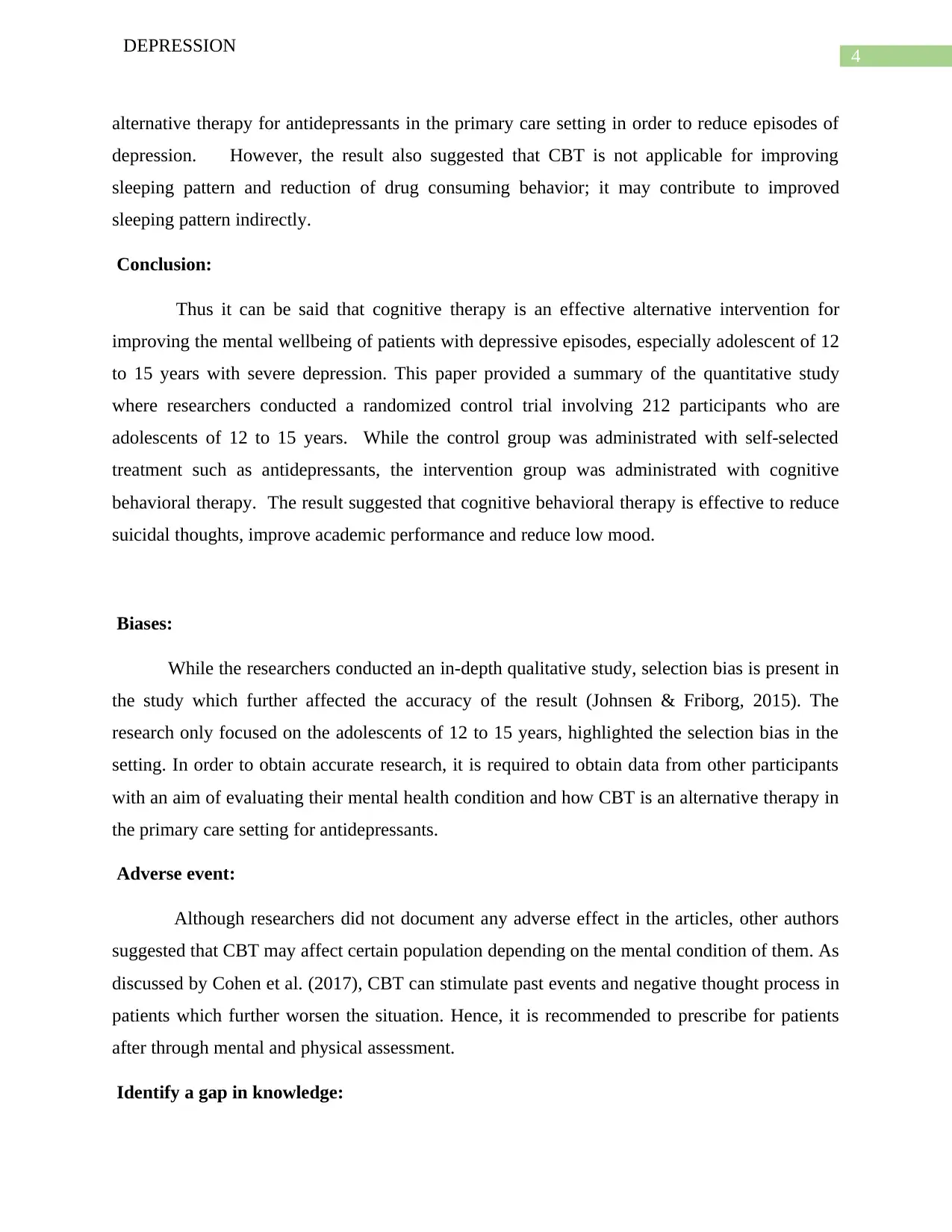
4
DEPRESSION
alternative therapy for antidepressants in the primary care setting in order to reduce episodes of
depression. However, the result also suggested that CBT is not applicable for improving
sleeping pattern and reduction of drug consuming behavior; it may contribute to improved
sleeping pattern indirectly.
Conclusion:
Thus it can be said that cognitive therapy is an effective alternative intervention for
improving the mental wellbeing of patients with depressive episodes, especially adolescent of 12
to 15 years with severe depression. This paper provided a summary of the quantitative study
where researchers conducted a randomized control trial involving 212 participants who are
adolescents of 12 to 15 years. While the control group was administrated with self-selected
treatment such as antidepressants, the intervention group was administrated with cognitive
behavioral therapy. The result suggested that cognitive behavioral therapy is effective to reduce
suicidal thoughts, improve academic performance and reduce low mood.
Biases:
While the researchers conducted an in-depth qualitative study, selection bias is present in
the study which further affected the accuracy of the result (Johnsen & Friborg, 2015). The
research only focused on the adolescents of 12 to 15 years, highlighted the selection bias in the
setting. In order to obtain accurate research, it is required to obtain data from other participants
with an aim of evaluating their mental health condition and how CBT is an alternative therapy in
the primary care setting for antidepressants.
Adverse event:
Although researchers did not document any adverse effect in the articles, other authors
suggested that CBT may affect certain population depending on the mental condition of them. As
discussed by Cohen et al. (2017), CBT can stimulate past events and negative thought process in
patients which further worsen the situation. Hence, it is recommended to prescribe for patients
after through mental and physical assessment.
Identify a gap in knowledge:
DEPRESSION
alternative therapy for antidepressants in the primary care setting in order to reduce episodes of
depression. However, the result also suggested that CBT is not applicable for improving
sleeping pattern and reduction of drug consuming behavior; it may contribute to improved
sleeping pattern indirectly.
Conclusion:
Thus it can be said that cognitive therapy is an effective alternative intervention for
improving the mental wellbeing of patients with depressive episodes, especially adolescent of 12
to 15 years with severe depression. This paper provided a summary of the quantitative study
where researchers conducted a randomized control trial involving 212 participants who are
adolescents of 12 to 15 years. While the control group was administrated with self-selected
treatment such as antidepressants, the intervention group was administrated with cognitive
behavioral therapy. The result suggested that cognitive behavioral therapy is effective to reduce
suicidal thoughts, improve academic performance and reduce low mood.
Biases:
While the researchers conducted an in-depth qualitative study, selection bias is present in
the study which further affected the accuracy of the result (Johnsen & Friborg, 2015). The
research only focused on the adolescents of 12 to 15 years, highlighted the selection bias in the
setting. In order to obtain accurate research, it is required to obtain data from other participants
with an aim of evaluating their mental health condition and how CBT is an alternative therapy in
the primary care setting for antidepressants.
Adverse event:
Although researchers did not document any adverse effect in the articles, other authors
suggested that CBT may affect certain population depending on the mental condition of them. As
discussed by Cohen et al. (2017), CBT can stimulate past events and negative thought process in
patients which further worsen the situation. Hence, it is recommended to prescribe for patients
after through mental and physical assessment.
Identify a gap in knowledge:
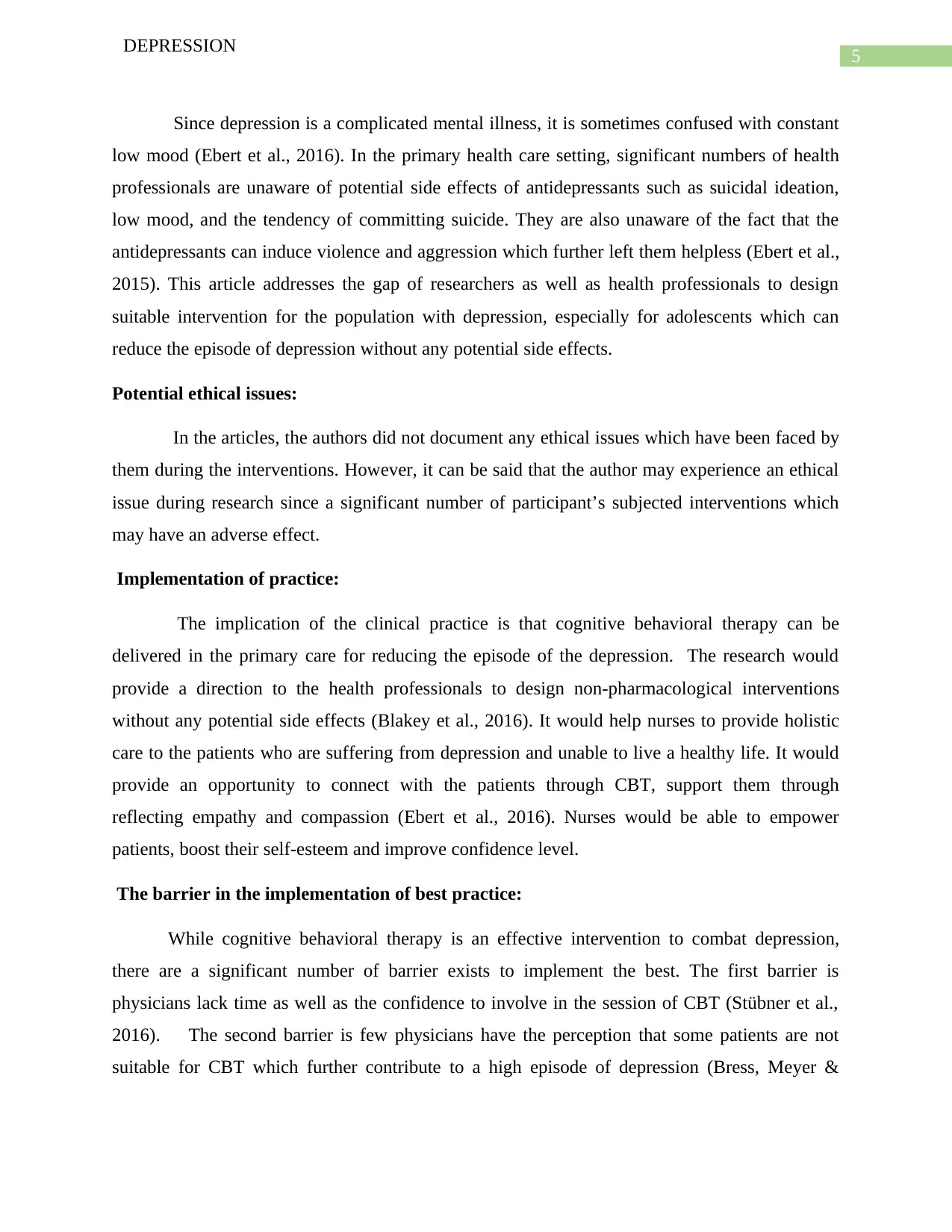
5
DEPRESSION
Since depression is a complicated mental illness, it is sometimes confused with constant
low mood (Ebert et al., 2016). In the primary health care setting, significant numbers of health
professionals are unaware of potential side effects of antidepressants such as suicidal ideation,
low mood, and the tendency of committing suicide. They are also unaware of the fact that the
antidepressants can induce violence and aggression which further left them helpless (Ebert et al.,
2015). This article addresses the gap of researchers as well as health professionals to design
suitable intervention for the population with depression, especially for adolescents which can
reduce the episode of depression without any potential side effects.
Potential ethical issues:
In the articles, the authors did not document any ethical issues which have been faced by
them during the interventions. However, it can be said that the author may experience an ethical
issue during research since a significant number of participant’s subjected interventions which
may have an adverse effect.
Implementation of practice:
The implication of the clinical practice is that cognitive behavioral therapy can be
delivered in the primary care for reducing the episode of the depression. The research would
provide a direction to the health professionals to design non-pharmacological interventions
without any potential side effects (Blakey et al., 2016). It would help nurses to provide holistic
care to the patients who are suffering from depression and unable to live a healthy life. It would
provide an opportunity to connect with the patients through CBT, support them through
reflecting empathy and compassion (Ebert et al., 2016). Nurses would be able to empower
patients, boost their self-esteem and improve confidence level.
The barrier in the implementation of best practice:
While cognitive behavioral therapy is an effective intervention to combat depression,
there are a significant number of barrier exists to implement the best. The first barrier is
physicians lack time as well as the confidence to involve in the session of CBT (Stübner et al.,
2016). The second barrier is few physicians have the perception that some patients are not
suitable for CBT which further contribute to a high episode of depression (Bress, Meyer &
DEPRESSION
Since depression is a complicated mental illness, it is sometimes confused with constant
low mood (Ebert et al., 2016). In the primary health care setting, significant numbers of health
professionals are unaware of potential side effects of antidepressants such as suicidal ideation,
low mood, and the tendency of committing suicide. They are also unaware of the fact that the
antidepressants can induce violence and aggression which further left them helpless (Ebert et al.,
2015). This article addresses the gap of researchers as well as health professionals to design
suitable intervention for the population with depression, especially for adolescents which can
reduce the episode of depression without any potential side effects.
Potential ethical issues:
In the articles, the authors did not document any ethical issues which have been faced by
them during the interventions. However, it can be said that the author may experience an ethical
issue during research since a significant number of participant’s subjected interventions which
may have an adverse effect.
Implementation of practice:
The implication of the clinical practice is that cognitive behavioral therapy can be
delivered in the primary care for reducing the episode of the depression. The research would
provide a direction to the health professionals to design non-pharmacological interventions
without any potential side effects (Blakey et al., 2016). It would help nurses to provide holistic
care to the patients who are suffering from depression and unable to live a healthy life. It would
provide an opportunity to connect with the patients through CBT, support them through
reflecting empathy and compassion (Ebert et al., 2016). Nurses would be able to empower
patients, boost their self-esteem and improve confidence level.
The barrier in the implementation of best practice:
While cognitive behavioral therapy is an effective intervention to combat depression,
there are a significant number of barrier exists to implement the best. The first barrier is
physicians lack time as well as the confidence to involve in the session of CBT (Stübner et al.,
2016). The second barrier is few physicians have the perception that some patients are not
suitable for CBT which further contribute to a high episode of depression (Bress, Meyer &
⊘ This is a preview!⊘
Do you want full access?
Subscribe today to unlock all pages.

Trusted by 1+ million students worldwide
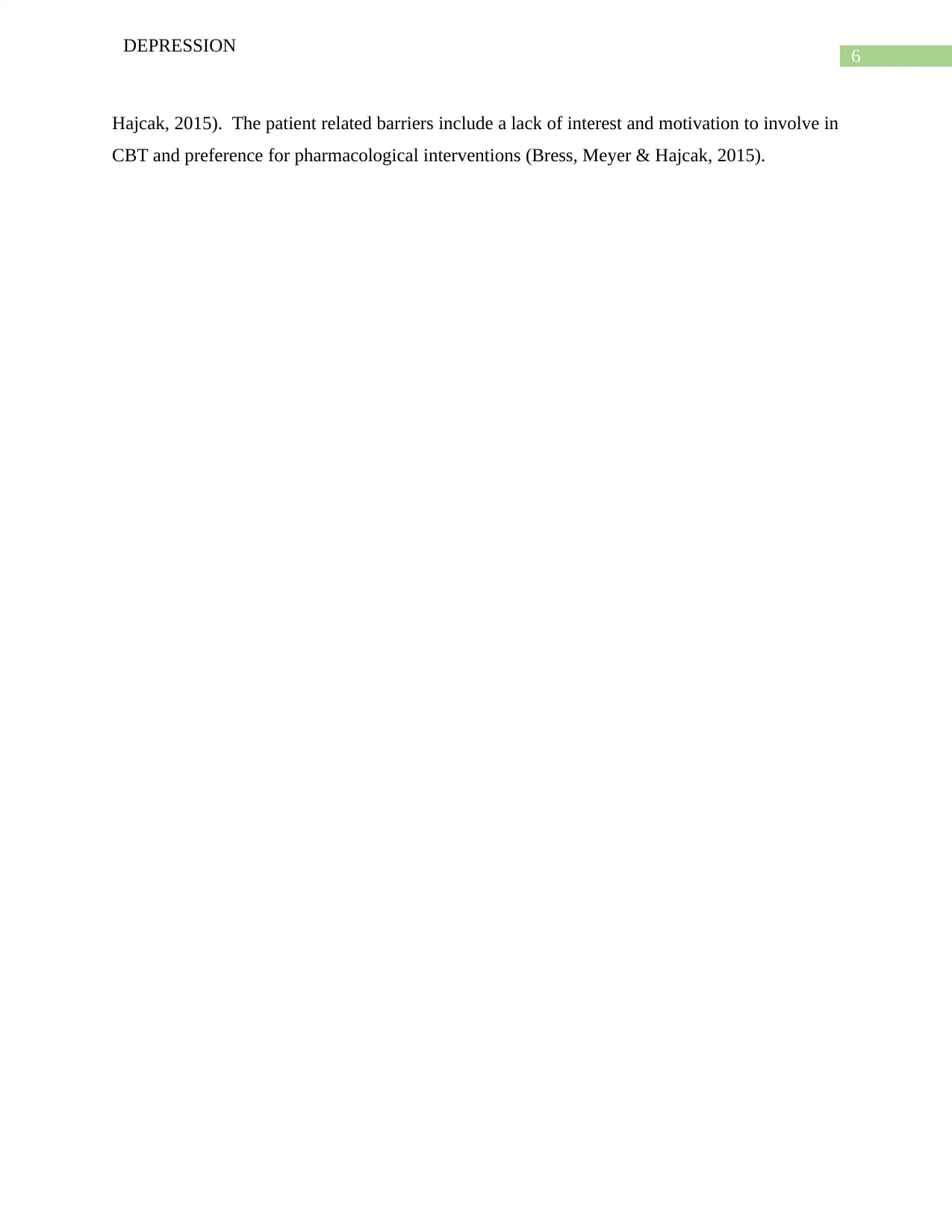
6
DEPRESSION
Hajcak, 2015). The patient related barriers include a lack of interest and motivation to involve in
CBT and preference for pharmacological interventions (Bress, Meyer & Hajcak, 2015).
DEPRESSION
Hajcak, 2015). The patient related barriers include a lack of interest and motivation to involve in
CBT and preference for pharmacological interventions (Bress, Meyer & Hajcak, 2015).
Paraphrase This Document
Need a fresh take? Get an instant paraphrase of this document with our AI Paraphraser
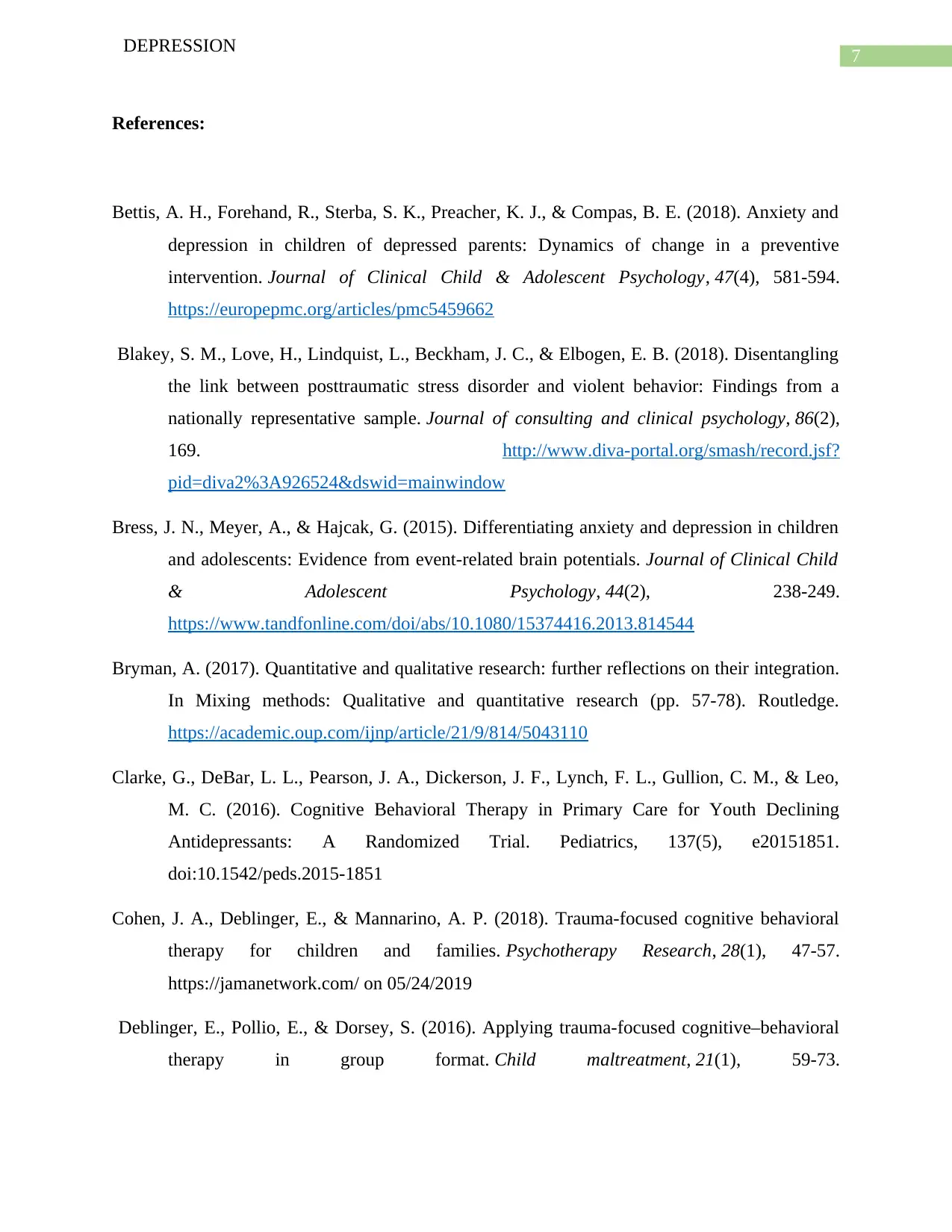
7
DEPRESSION
References:
Bettis, A. H., Forehand, R., Sterba, S. K., Preacher, K. J., & Compas, B. E. (2018). Anxiety and
depression in children of depressed parents: Dynamics of change in a preventive
intervention. Journal of Clinical Child & Adolescent Psychology, 47(4), 581-594.
https://europepmc.org/articles/pmc5459662
Blakey, S. M., Love, H., Lindquist, L., Beckham, J. C., & Elbogen, E. B. (2018). Disentangling
the link between posttraumatic stress disorder and violent behavior: Findings from a
nationally representative sample. Journal of consulting and clinical psychology, 86(2),
169. http://www.diva-portal.org/smash/record.jsf?
pid=diva2%3A926524&dswid=mainwindow
Bress, J. N., Meyer, A., & Hajcak, G. (2015). Differentiating anxiety and depression in children
and adolescents: Evidence from event-related brain potentials. Journal of Clinical Child
& Adolescent Psychology, 44(2), 238-249.
https://www.tandfonline.com/doi/abs/10.1080/15374416.2013.814544
Bryman, A. (2017). Quantitative and qualitative research: further reflections on their integration.
In Mixing methods: Qualitative and quantitative research (pp. 57-78). Routledge.
https://academic.oup.com/ijnp/article/21/9/814/5043110
Clarke, G., DeBar, L. L., Pearson, J. A., Dickerson, J. F., Lynch, F. L., Gullion, C. M., & Leo,
M. C. (2016). Cognitive Behavioral Therapy in Primary Care for Youth Declining
Antidepressants: A Randomized Trial. Pediatrics, 137(5), e20151851.
doi:10.1542/peds.2015-1851
Cohen, J. A., Deblinger, E., & Mannarino, A. P. (2018). Trauma-focused cognitive behavioral
therapy for children and families. Psychotherapy Research, 28(1), 47-57.
https://jamanetwork.com/ on 05/24/2019
Deblinger, E., Pollio, E., & Dorsey, S. (2016). Applying trauma-focused cognitive–behavioral
therapy in group format. Child maltreatment, 21(1), 59-73.
DEPRESSION
References:
Bettis, A. H., Forehand, R., Sterba, S. K., Preacher, K. J., & Compas, B. E. (2018). Anxiety and
depression in children of depressed parents: Dynamics of change in a preventive
intervention. Journal of Clinical Child & Adolescent Psychology, 47(4), 581-594.
https://europepmc.org/articles/pmc5459662
Blakey, S. M., Love, H., Lindquist, L., Beckham, J. C., & Elbogen, E. B. (2018). Disentangling
the link between posttraumatic stress disorder and violent behavior: Findings from a
nationally representative sample. Journal of consulting and clinical psychology, 86(2),
169. http://www.diva-portal.org/smash/record.jsf?
pid=diva2%3A926524&dswid=mainwindow
Bress, J. N., Meyer, A., & Hajcak, G. (2015). Differentiating anxiety and depression in children
and adolescents: Evidence from event-related brain potentials. Journal of Clinical Child
& Adolescent Psychology, 44(2), 238-249.
https://www.tandfonline.com/doi/abs/10.1080/15374416.2013.814544
Bryman, A. (2017). Quantitative and qualitative research: further reflections on their integration.
In Mixing methods: Qualitative and quantitative research (pp. 57-78). Routledge.
https://academic.oup.com/ijnp/article/21/9/814/5043110
Clarke, G., DeBar, L. L., Pearson, J. A., Dickerson, J. F., Lynch, F. L., Gullion, C. M., & Leo,
M. C. (2016). Cognitive Behavioral Therapy in Primary Care for Youth Declining
Antidepressants: A Randomized Trial. Pediatrics, 137(5), e20151851.
doi:10.1542/peds.2015-1851
Cohen, J. A., Deblinger, E., & Mannarino, A. P. (2018). Trauma-focused cognitive behavioral
therapy for children and families. Psychotherapy Research, 28(1), 47-57.
https://jamanetwork.com/ on 05/24/2019
Deblinger, E., Pollio, E., & Dorsey, S. (2016). Applying trauma-focused cognitive–behavioral
therapy in group format. Child maltreatment, 21(1), 59-73.
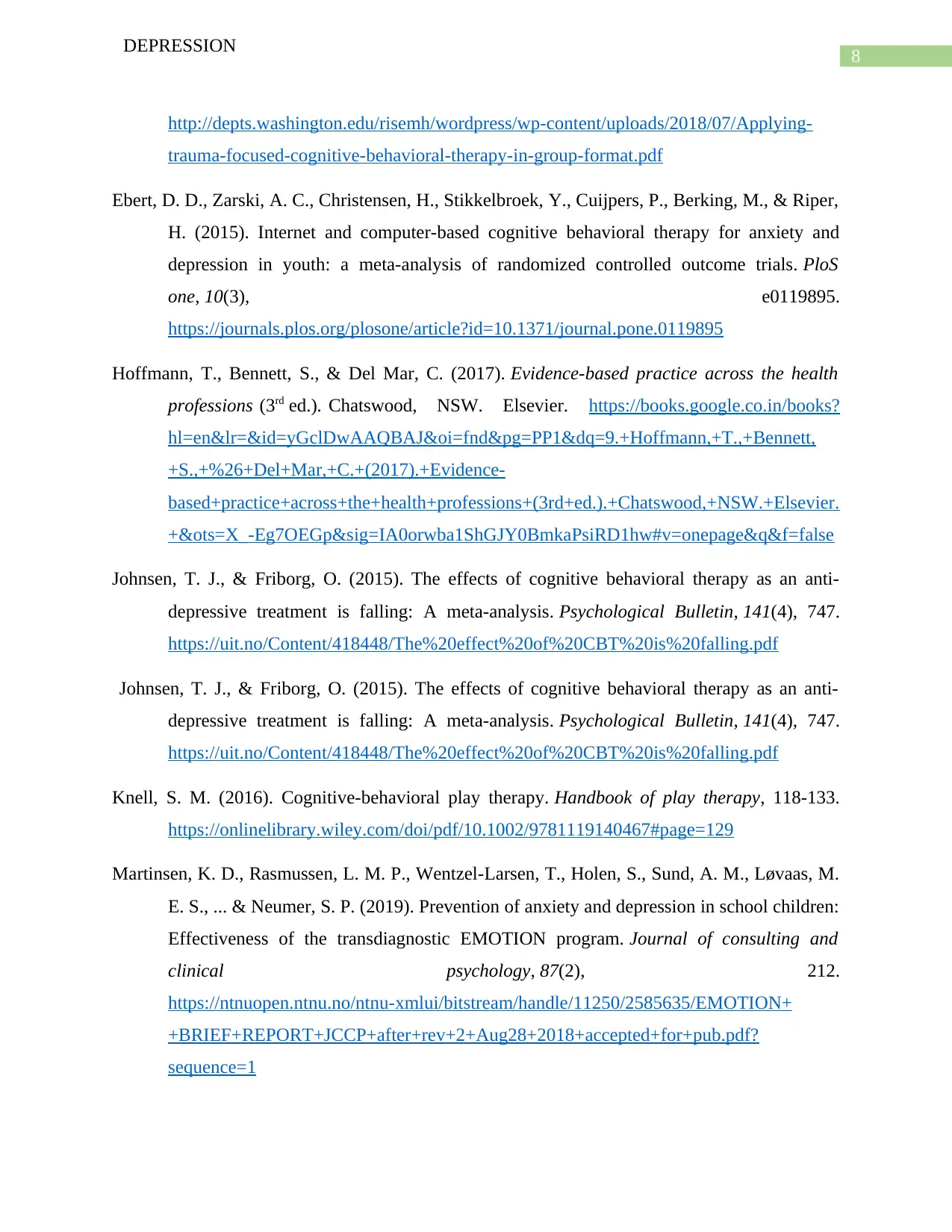
8
DEPRESSION
http://depts.washington.edu/risemh/wordpress/wp-content/uploads/2018/07/Applying-
trauma-focused-cognitive-behavioral-therapy-in-group-format.pdf
Ebert, D. D., Zarski, A. C., Christensen, H., Stikkelbroek, Y., Cuijpers, P., Berking, M., & Riper,
H. (2015). Internet and computer-based cognitive behavioral therapy for anxiety and
depression in youth: a meta-analysis of randomized controlled outcome trials. PloS
one, 10(3), e0119895.
https://journals.plos.org/plosone/article?id=10.1371/journal.pone.0119895
Hoffmann, T., Bennett, S., & Del Mar, C. (2017). Evidence-based practice across the health
professions (3rd ed.). Chatswood, NSW. Elsevier. https://books.google.co.in/books?
hl=en&lr=&id=yGclDwAAQBAJ&oi=fnd&pg=PP1&dq=9.+Hoffmann,+T.,+Bennett,
+S.,+%26+Del+Mar,+C.+(2017).+Evidence-
based+practice+across+the+health+professions+(3rd+ed.).+Chatswood,+NSW.+Elsevier.
+&ots=X_-Eg7OEGp&sig=IA0orwba1ShGJY0BmkaPsiRD1hw#v=onepage&q&f=false
Johnsen, T. J., & Friborg, O. (2015). The effects of cognitive behavioral therapy as an anti-
depressive treatment is falling: A meta-analysis. Psychological Bulletin, 141(4), 747.
https://uit.no/Content/418448/The%20effect%20of%20CBT%20is%20falling.pdf
Johnsen, T. J., & Friborg, O. (2015). The effects of cognitive behavioral therapy as an anti-
depressive treatment is falling: A meta-analysis. Psychological Bulletin, 141(4), 747.
https://uit.no/Content/418448/The%20effect%20of%20CBT%20is%20falling.pdf
Knell, S. M. (2016). Cognitive-behavioral play therapy. Handbook of play therapy, 118-133.
https://onlinelibrary.wiley.com/doi/pdf/10.1002/9781119140467#page=129
Martinsen, K. D., Rasmussen, L. M. P., Wentzel-Larsen, T., Holen, S., Sund, A. M., Løvaas, M.
E. S., ... & Neumer, S. P. (2019). Prevention of anxiety and depression in school children:
Effectiveness of the transdiagnostic EMOTION program. Journal of consulting and
clinical psychology, 87(2), 212.
https://ntnuopen.ntnu.no/ntnu-xmlui/bitstream/handle/11250/2585635/EMOTION+
+BRIEF+REPORT+JCCP+after+rev+2+Aug28+2018+accepted+for+pub.pdf?
sequence=1
DEPRESSION
http://depts.washington.edu/risemh/wordpress/wp-content/uploads/2018/07/Applying-
trauma-focused-cognitive-behavioral-therapy-in-group-format.pdf
Ebert, D. D., Zarski, A. C., Christensen, H., Stikkelbroek, Y., Cuijpers, P., Berking, M., & Riper,
H. (2015). Internet and computer-based cognitive behavioral therapy for anxiety and
depression in youth: a meta-analysis of randomized controlled outcome trials. PloS
one, 10(3), e0119895.
https://journals.plos.org/plosone/article?id=10.1371/journal.pone.0119895
Hoffmann, T., Bennett, S., & Del Mar, C. (2017). Evidence-based practice across the health
professions (3rd ed.). Chatswood, NSW. Elsevier. https://books.google.co.in/books?
hl=en&lr=&id=yGclDwAAQBAJ&oi=fnd&pg=PP1&dq=9.+Hoffmann,+T.,+Bennett,
+S.,+%26+Del+Mar,+C.+(2017).+Evidence-
based+practice+across+the+health+professions+(3rd+ed.).+Chatswood,+NSW.+Elsevier.
+&ots=X_-Eg7OEGp&sig=IA0orwba1ShGJY0BmkaPsiRD1hw#v=onepage&q&f=false
Johnsen, T. J., & Friborg, O. (2015). The effects of cognitive behavioral therapy as an anti-
depressive treatment is falling: A meta-analysis. Psychological Bulletin, 141(4), 747.
https://uit.no/Content/418448/The%20effect%20of%20CBT%20is%20falling.pdf
Johnsen, T. J., & Friborg, O. (2015). The effects of cognitive behavioral therapy as an anti-
depressive treatment is falling: A meta-analysis. Psychological Bulletin, 141(4), 747.
https://uit.no/Content/418448/The%20effect%20of%20CBT%20is%20falling.pdf
Knell, S. M. (2016). Cognitive-behavioral play therapy. Handbook of play therapy, 118-133.
https://onlinelibrary.wiley.com/doi/pdf/10.1002/9781119140467#page=129
Martinsen, K. D., Rasmussen, L. M. P., Wentzel-Larsen, T., Holen, S., Sund, A. M., Løvaas, M.
E. S., ... & Neumer, S. P. (2019). Prevention of anxiety and depression in school children:
Effectiveness of the transdiagnostic EMOTION program. Journal of consulting and
clinical psychology, 87(2), 212.
https://ntnuopen.ntnu.no/ntnu-xmlui/bitstream/handle/11250/2585635/EMOTION+
+BRIEF+REPORT+JCCP+after+rev+2+Aug28+2018+accepted+for+pub.pdf?
sequence=1
⊘ This is a preview!⊘
Do you want full access?
Subscribe today to unlock all pages.

Trusted by 1+ million students worldwide
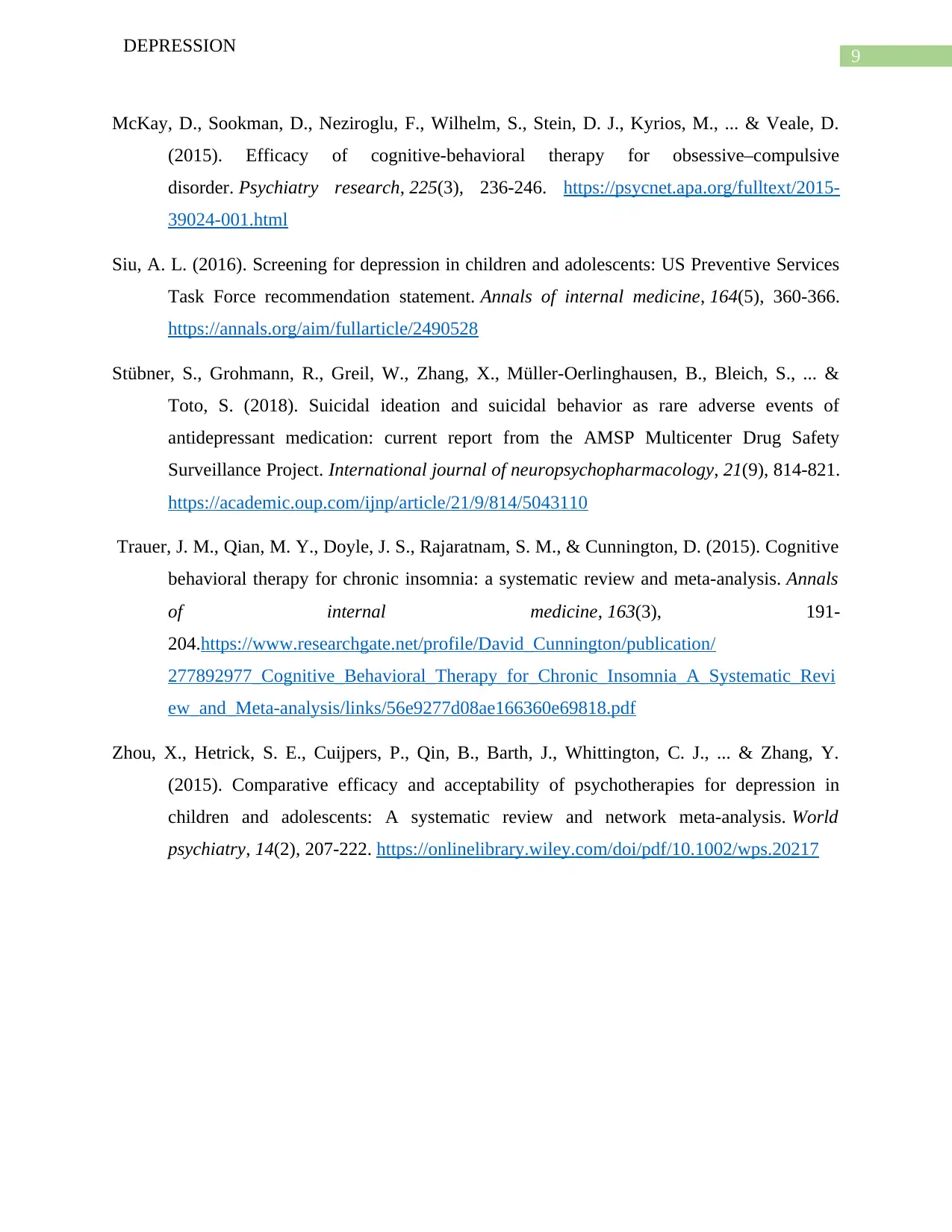
9
DEPRESSION
McKay, D., Sookman, D., Neziroglu, F., Wilhelm, S., Stein, D. J., Kyrios, M., ... & Veale, D.
(2015). Efficacy of cognitive-behavioral therapy for obsessive–compulsive
disorder. Psychiatry research, 225(3), 236-246. https://psycnet.apa.org/fulltext/2015-
39024-001.html
Siu, A. L. (2016). Screening for depression in children and adolescents: US Preventive Services
Task Force recommendation statement. Annals of internal medicine, 164(5), 360-366.
https://annals.org/aim/fullarticle/2490528
Stübner, S., Grohmann, R., Greil, W., Zhang, X., Müller-Oerlinghausen, B., Bleich, S., ... &
Toto, S. (2018). Suicidal ideation and suicidal behavior as rare adverse events of
antidepressant medication: current report from the AMSP Multicenter Drug Safety
Surveillance Project. International journal of neuropsychopharmacology, 21(9), 814-821.
https://academic.oup.com/ijnp/article/21/9/814/5043110
Trauer, J. M., Qian, M. Y., Doyle, J. S., Rajaratnam, S. M., & Cunnington, D. (2015). Cognitive
behavioral therapy for chronic insomnia: a systematic review and meta-analysis. Annals
of internal medicine, 163(3), 191-
204.https://www.researchgate.net/profile/David_Cunnington/publication/
277892977_Cognitive_Behavioral_Therapy_for_Chronic_Insomnia_A_Systematic_Revi
ew_and_Meta-analysis/links/56e9277d08ae166360e69818.pdf
Zhou, X., Hetrick, S. E., Cuijpers, P., Qin, B., Barth, J., Whittington, C. J., ... & Zhang, Y.
(2015). Comparative efficacy and acceptability of psychotherapies for depression in
children and adolescents: A systematic review and network meta‐analysis. World
psychiatry, 14(2), 207-222. https://onlinelibrary.wiley.com/doi/pdf/10.1002/wps.20217
DEPRESSION
McKay, D., Sookman, D., Neziroglu, F., Wilhelm, S., Stein, D. J., Kyrios, M., ... & Veale, D.
(2015). Efficacy of cognitive-behavioral therapy for obsessive–compulsive
disorder. Psychiatry research, 225(3), 236-246. https://psycnet.apa.org/fulltext/2015-
39024-001.html
Siu, A. L. (2016). Screening for depression in children and adolescents: US Preventive Services
Task Force recommendation statement. Annals of internal medicine, 164(5), 360-366.
https://annals.org/aim/fullarticle/2490528
Stübner, S., Grohmann, R., Greil, W., Zhang, X., Müller-Oerlinghausen, B., Bleich, S., ... &
Toto, S. (2018). Suicidal ideation and suicidal behavior as rare adverse events of
antidepressant medication: current report from the AMSP Multicenter Drug Safety
Surveillance Project. International journal of neuropsychopharmacology, 21(9), 814-821.
https://academic.oup.com/ijnp/article/21/9/814/5043110
Trauer, J. M., Qian, M. Y., Doyle, J. S., Rajaratnam, S. M., & Cunnington, D. (2015). Cognitive
behavioral therapy for chronic insomnia: a systematic review and meta-analysis. Annals
of internal medicine, 163(3), 191-
204.https://www.researchgate.net/profile/David_Cunnington/publication/
277892977_Cognitive_Behavioral_Therapy_for_Chronic_Insomnia_A_Systematic_Revi
ew_and_Meta-analysis/links/56e9277d08ae166360e69818.pdf
Zhou, X., Hetrick, S. E., Cuijpers, P., Qin, B., Barth, J., Whittington, C. J., ... & Zhang, Y.
(2015). Comparative efficacy and acceptability of psychotherapies for depression in
children and adolescents: A systematic review and network meta‐analysis. World
psychiatry, 14(2), 207-222. https://onlinelibrary.wiley.com/doi/pdf/10.1002/wps.20217
1 out of 10
Related Documents
Your All-in-One AI-Powered Toolkit for Academic Success.
+13062052269
info@desklib.com
Available 24*7 on WhatsApp / Email
![[object Object]](/_next/static/media/star-bottom.7253800d.svg)
Unlock your academic potential
Copyright © 2020–2026 A2Z Services. All Rights Reserved. Developed and managed by ZUCOL.




